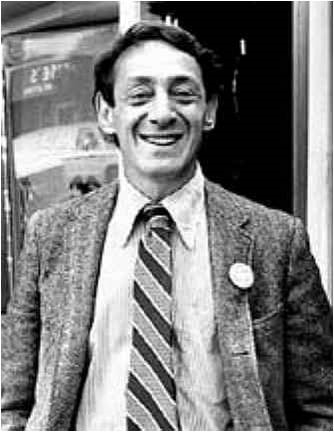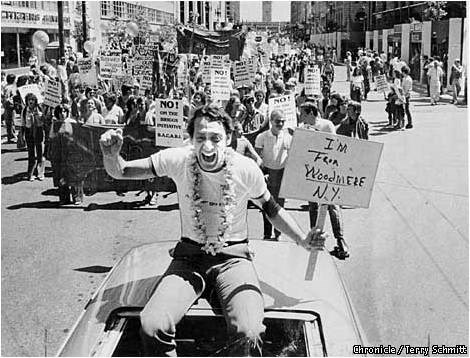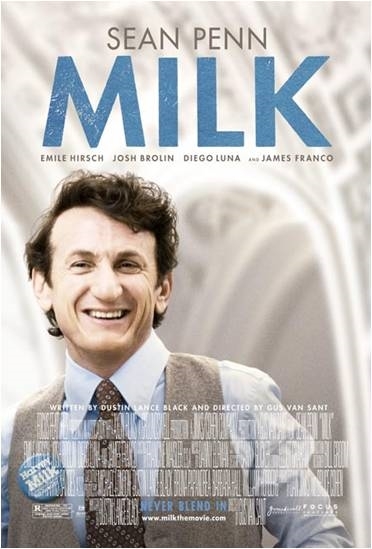 |
| Portrait of Harvey Milk (http://amadeo.blog.com/repository/1876991/4049736.jpg) |
There is a well known Chinese proverb that states “Before preparing to improve the world first look around your own home three times.” Advancements in the world never start as extensive challenges for each person to understand. Advancements start as small changes in the way people locally think and act; progressing nationally and then globally. Harvey Milk understood this paradox. He infiltrated the world of politics in hope that he could eradicate bigotry towards gays and lesbians in San Francisco. Harvey Milk was a beacon of hope to the gay and lesbian community, initiating an incline in gay representation and activism in government.
Harvey Milk was born on May 22, 1930, in Woodmere, New York. After graduating from The New York State College for Teachers in Albany, he immediately joined the navy. In 1955, he was given an honorable discharge and proceeded to work in New York as a high school teacher. In the years that followed, Milk moved between New York and San Francisco with a number of his partners. In 1973, Milk entered politics, running against 31 other candidates for a position on the San Francisco Board of Supervisors. Milk came in 10th place overall, but finally was victorious in 1977. In 1978, only months after his election, Dan White, a former member of The Board of Supervisors shot and killed Harvey Milk and the mayor, George Moscone.
 |
| Protests (sign reads I'm from Woodmere N.Y.) (http://ninjaradio.files.wordpress.com/2009/05/harvey-milk.jpg) |
Despite coming in 10th in his first showing Milk had ignited interests in local politics. The campaign had been “not a bad showing for a long-haired, openly gay, Jewish man with no political experience and relatively meager campaign funds.” (Harvey Bernard Milk) His ideals caught the attention of the gay community in San Francisco and he became known as “The Unofficial Mayor of Castro Street.”
In the years preceding Milk’s political debut he had looked much like an aging hippie (Harvey Bernard Milk). To ensure he received appropriate awareness to his cause and his campaign Milk sacrificed his former way of life. He gave up his rugged hair and smoking marijuana. His outrage over the absence of gay representation drove him to surrender much of his time, money, and ultimately his life to the gay rights movement.
Harvey Milk rose above the bigotry and stereotype that swarmed him during the elections. He battled for gay rights in San Francisco, and was once quoted in The Chronicle saying “If I turned around every time somebody called me a [name], I’d be walking backwards – and I don’t want to walk backwards.” Milk’s position never wavered, however, nor did he cease his operation when bombarded with animosity or malice. He was once quoted “Burst down those closet doors once and for all, and stand up and start to fight”. Milk’s ambition was that one day every gay man and lesbian woman would be treated equally and with respect by not only their government but by their neighbors and family members. Milk wanted to detach the shame that accompanied being homosexual.
At approximately the same time as the second election Milk set out to strengthen his campaign. He solidified his place in the polls by forming alliances with labor unions; one of which he exchanged support with advocating for the gay community to boycott Coors Beer. Affiliations with other minorities in the city, that were also lacking any representation in government, were made. These groups hoped that when Milk entered government he would assist in improving equality for all men and women in the city.
 |
| movie promo (http://smackamack.files.wordpress.com/2009/03/milk-poster-sean-penn.jpg) |
Throughout his stint in office he addressed many different issues that had been steadily advancing in California. He worked to discontinue a proposition that would restrain gays and lesbians from working in public schools as teachers. He also passed multiple bills that banned the refusal of a job or housing application based on sexual orientation. “Milk has become a symbol for the gay community of both what has been achieved and what remains to be done.” (Harvey Bernard Milk).
Even in the face of his untimely assassination Harvey Milk never altered his fundamental beliefs in how he wished the San Francisco government to act for and to its people. He left a will, a letter and a recording to be shown in the event of his murder. Milk wrote “Knowing that it could happen, hoping that it doesn’t, and if it does, I think I’ve already achieved something” (Note about assassination). The threat of death was an ever present worry to Milk and those who loved him. He had proposed many developments in government, and understood the hazard. In the recording he said “ I fully realize that a person who stands for what I stand for, an activist, a gay activist, becomes the target or the potential target for a person who is insecure, terrified, afraid, or very disturbed with themselves.”
Harvey Milk is memorialized in a number of different ways including a movie, documentaries, a parade and a school. The movie named “Milk” debuted in 2008, the lead being played by Sean Penn, who won an Oscar for best actor for his touching portrayal of Harvey Milk’s life.
Harvey Milk sacrificed his own personal comfort and his life to assure that all people had equal and fair representation in their government. He overcame the fear and bigotry surrounding him to symbolize the truth of gay and lesbian life. He lead the revolution of gay activism and political figures. Without Harvey Milk our country would not have taken the strides we have in government today.
Page created on 5/19/2010 12:00:00 AM
Last edited 5/19/2010 12:00:00 AM
